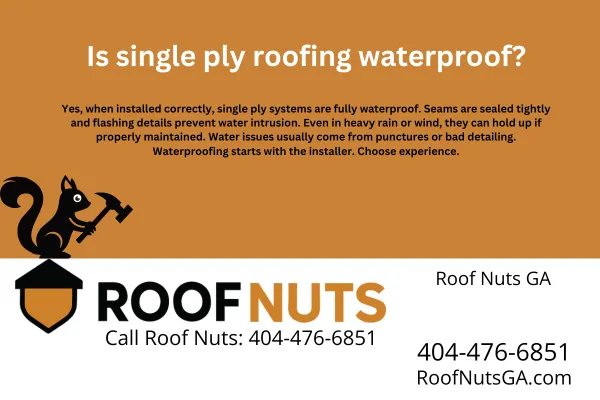
Is single ply roofing waterproof?
Is Single Ply Roofing Waterproof? | Georgia Roofing FAQ
Yes — when installed correctly, single ply roofing is fully waterproof.
Single ply membranes like TPO, PVC, and EPDM are designed to create a continuous, watertight barrier across flat and low-slope roofs. The seams are sealed using heat welding or adhesive systems, and critical details like flashing and penetrations are reinforced to prevent leaks.
What makes it waterproof?
Sealed seams – Hot-air welding or adhesives create tight bonds between sheets.
Flashing details – Edges, drains, and roof penetrations are reinforced and sealed.
Continuous membrane – No exposed joints or gaps when installed properly.
Compatible substrates – Installed over insulation and underlayment that support drainage.
When does it fail?
Waterproofing failures usually come from:
Poor installation or detailing
Mechanical damage (punctures from tools or debris)
Shrinkage or lifting seams over time
UV or chemical degradation (especially if the roof isn't maintained)
In Georgia’s hot, humid, and storm-prone climate, this risk increases if the installer cuts corners or uses the wrong materials.
Why installation quality matters
Waterproofing depends on the installer more than the product. A bad seam or rushed flashing job can lead to leaks even if the membrane itself is premium quality.
At Roof Nuts, we’ve seen firsthand how poor detailing causes most flat roof failures — not the materials.
FAQ: What Georgia Homeowners Want to Know
How long does single ply roofing last?
With proper installation and maintenance, single ply roofs can last 20–30 years.
Does it need regular maintenance?
Yes. Seasonal inspections and minor repairs help catch punctures or lifting seams early before they turn into leaks.
Is single ply good for commercial or residential?
Both. It’s popular for commercial flat roofs but is also used on modern residential low-slope designs.
Can single ply handle Georgia storms?
Yes, if it’s correctly installed and maintained. Flashing and wind-uplift resistance are key for storm protection.
Which is better – TPO, EPDM, or PVC?
Each has pros and cons depending on your building type and budget. TPO is common in Georgia for its heat reflectivity and price. PVC offers strong chemical resistance. EPDM is flexible and proven over decades.
Need Help with Your Flat Roof in Georgia?
If you're in Atlanta, Augusta, Columbus, Macon, or anywhere in Georgia and need a new single ply roof — or you're worried about leaks — give us a call.
Call Roof Nuts at 404-476-6851 or visit RoofNutsGA.com
We specialize in waterproof roofing done right — the first time.